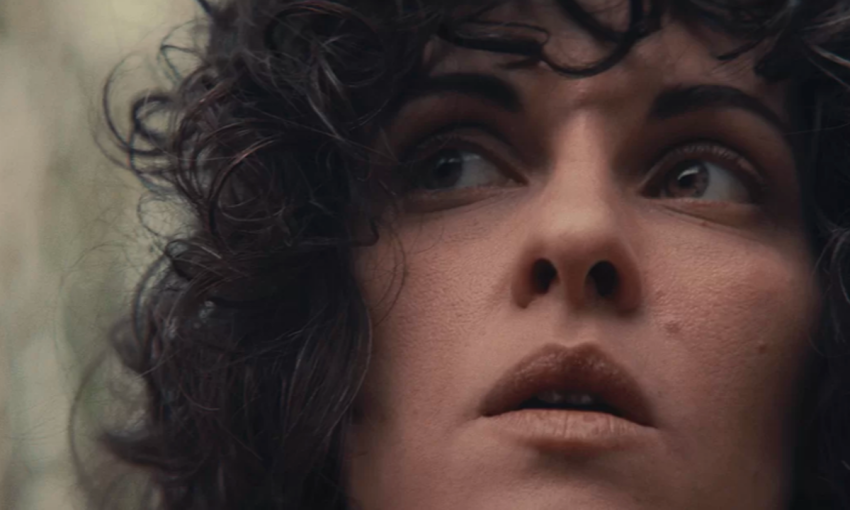What if, every time you woke up, you were in a completely different year and at a completely different stage of your life?
AFF review: Embryo Larva Butterfly
Directed by Kyros Papavassiliou, Embryo Larva Butterfly (Embryo) is one of the latest additions to the “Greek Weird Wave” to screen at this year’s Adelaide Film Festival.
One of the most audacious movements in contemporary world cinema, the Weird Wave is headed by filmmakers like Yorgos Lanthimos (The Killing of a Sacred Deer, Poor Things) and Panos Koutras (Strella).
Embryo Larva Butterfly screens again at the Adelaide Film Festival on Wed 25 Oct 7:30 PM, Palace Nova Eastend Eximax.
See the full program here.
Flirting with science fiction and absurdist themes, these experimental, stylish films ruminate on what it means to be human, incorporating strong social and cultural critiques about gender, technology, capitalism and love.
Embryo is Cypriot Papavassiliou’s second feature-length film, following 2015’s Impressions of a Drowned Man, and it had its world premiere at Karlovy Vary Film Festival in the Czech Republic earlier this year.
The film follows a couple, Penelope (Maria Apostolakea) and Isidoros (Hristos Sougaris), as they navigate a world in which “linear time” has been replaced by “arbitrary time”. One day, the couple wake up and they are young lovers in 2005 – in the next moment, they are in 2036, recovering from the aftermath of their divorce.
Throughout the film, the couple grapple with the dilemma of maintaining hope in the face of the heartbreak that they have foreseen in their futures, and with the powerlessness they face in an unpredictable world.
Embryo is a beautiful and brave film, languidly musing on how the modern world has fractured our sense of time.
This review was provided by the “2023 Emerging Screen Critics Program” – a Screen Studies collaboration between the Adelaide Film Festival and UniSA Creative, with the participation of students and mentors from the University of South Australia, the University of Adelaide and Flinders University. Supported by CityMag.
Its most striking element is its impressive approach to film style, especially its use of cinematography. The world that Papavassiliou constructs is like a maze, filled with looming modernist architecture, eerie ambient music and layers of glistening mirrors, windows and screens.
Penelope’s and Isidoros’ bodies are often dwarfed by the film’s landscapes, highlighting just how lost and numb they feel in the face of an infinitely changing universe. A particularly moving reflection of the film’s unique sense of style occurs when Penelope awakes and finds herself in an elderly body, anxiously examining the new varicose veins on her legs within a massive, minimalist bedroom.
Papavassiliou tries to build a quite literal impression of what existing in “arbitrary time” would feel like: he includes depictions of a government agency of lost time and plays “time” forecasts on the radio.
While intent upon worldbuilding, the film’s convoluted narratives and plotlines mean that multiple characters sometimes lack context or development.
Penelope’s brother, for example, suffers from some kind of severe disability as a result of the effects of arbitrary time – but it is never properly explained why or how this occurred.
The film would have had more impactful if the narrative was left more ambiguous and open to interpretation. Additionally, unlike other Weird Wave films such as Lanthimos’ The Favourite (which features complex characterisations of flawed women), Penelope in Embryo is never given the opportunity to grow beyond the traditional roles of wife and mother, making her character difficult to empathise with at times.
A thought-provoking representation on how the collective traumas of modern existence have impacted our perception of time, Embryo Larva Butterfly is a film whose concept will stay with you for days after viewing.
In 2023, following the turbulence of the pandemic, growing political divisiveness and endless access to a 24-hour news cycle, the passing of time also feels increasingly “arbitrary” and fractured – just like in Papavassiliou’s film. Simply existing has become fraught with anxiety.
Penelope and Isidoros’ roles as emotional constants in each other’s lives provides a hopeful message: that no matter the instability of our world, love and connection will never cease to provide us meaning and joy.




